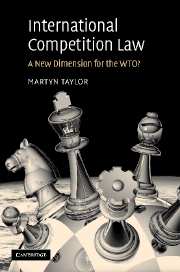Book contents
- Frontmatter
- Contents
- List of tables and figures
- List of abbreviations
- 1 Introduction
- PART I An International Competition Agreement is Desirable
- PART II The WTO Would Provide a Suitable Institutional Vehicle
- 6 Would the WTO provide a suitable institutional vehicle for an international competition agreement?
- 7 Would a WTO competition agreement promote international trade?
- 8 Would competition regulation of trade measures promote competition?
- 9 Should competition principles be introduced into anti-dumping law?
- PART III The Optimal Form for a WTO Competition Agreement
- APPENDIX: Draft negotiating text for a plurilateral WTO competition agreement
- Index
9 - Should competition principles be introduced into anti-dumping law?
Published online by Cambridge University Press: 17 July 2009
- Frontmatter
- Contents
- List of tables and figures
- List of abbreviations
- 1 Introduction
- PART I An International Competition Agreement is Desirable
- PART II The WTO Would Provide a Suitable Institutional Vehicle
- 6 Would the WTO provide a suitable institutional vehicle for an international competition agreement?
- 7 Would a WTO competition agreement promote international trade?
- 8 Would competition regulation of trade measures promote competition?
- 9 Should competition principles be introduced into anti-dumping law?
- PART III The Optimal Form for a WTO Competition Agreement
- APPENDIX: Draft negotiating text for a plurilateral WTO competition agreement
- Index
Summary
Anti-dumping laws are an issue at the forefront of any consideration of incorporation of competition laws into the WTO. This is because anti-dumping laws are the most obvious example of governmental trade measures that are permitted by WTO law, but that have significant potential adverse effects on international competition. In this manner, there is a potential direct conflict between existing international trade law and any international competition agreement. A chapter of this book has therefore been devoted to an analysis of anti-dumping laws, illustrating the benefits of amending the WTO anti-dumping provisions to incorporate a competition law approach.
In particular, Chapter 9 considers whether anti-dumping laws could be replaced or supplemented by competition laws in certain circumstances to mitigate the adverse effects of anti-dumping laws on international competition. Chapter 9 has two principal sections:
Section 9.1 considers the evolution of anti-dumping law and analyses its objectives in terms of economic efficiency and distributional equity. Section 9.1 identifies a number of procedural criticisms of anti-dumping law and recognises that in certain circumstances anti-dumping measures may reduce competition.
Section 9.2 considers international competition law as an alternative to anti-dumping law. In particular, Section 9.2 considers the replacement of anti-dumping law with competition law between Australia and New Zealand. Section 9.2 considers whether competition principles should be introduced into the Anti-dumping Agreement to ensure that anti-dumping measures do not adversely affect international competition.
Chapter 9 concludes that while there are clear advantages in replacing anti-dumping law with competition law, the pre-conditions for doing so are significant.
- Type
- Chapter
- Information
- International Competition LawA New Dimension for the WTO?, pp. 260 - 286Publisher: Cambridge University PressPrint publication year: 2006



